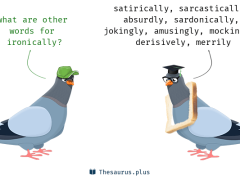hoax [həuks] n. 骗局,戏弄
deception [diˈsepʃən] n. 欺骗,骗局
【例】They attempted to practice deception on the public.
他们企图蒙骗公众。
【扩】swindle 诈骗,骗局 fraud 欺骗,诈骗
self-respecting [ˌselfriˈspektiŋ] adj. 自重的,自尊的
indulge [inˈdʌldʒ] v. 使沉迷,享受
【派】indulgence 沉迷
【搭】indulge in 沉迷于
* * *
A: Don't indulge yourself in eating and drinking.
B: I see. I will keep on struggling.
A:不要纵情于吃喝上。
B:明白,我会继续奋斗的。
* * *
pneumatic [njuːˈmætik] adj. 气动的
【派】pneumatically 气动的
【搭】pneumatic dill 气钻 pneumatic tires 充气轮胎 pneumatic cushion 气垫
drill [dril] n. 钻
silly [ˈsili] adj. 无意义的,无聊的
advance [ədˈvɑːns] adj. 预先的,事先获得的
【例】We are sold out three days in advance.
我们3天之内没票。
archway [ˈɑːtʃwei] n. 拱形门楼
remonstrate [ˈremənstreit] v. 规劝,告诫
【派】remonstration 忠告,规劝
【扩】exhort 规劝
【搭】remonstrate with sb. about sth. 规劝某人某事
ironically [aiˈrɔnikəli] adv. 讽刺地
permission [pəˈmiʃən] n. 许可
【扩】permit 许可证
* * *
A: You'll need to be in school all day once a week, plus one evening. Can you handle that?
B: Yes, I already have permission from my boss to take time off.
A:你需要每星期在学院上课一天和一个晚上。你能安排好吗?
B:可以,我已从老板那儿得到了休假上课的批准。
* * *
grant [ɡrɑːnt] v. 同意,准予
【派】grantor 授予者
* * *
A: They granted his request.
B: Why did they change their mind at last?
A:他们答应了他的要求。
B:他们最后怎么改变主意了?
noun [抽象名词]恶作剧,骗局;谎报 - He denied making the hoax call but was convicted after a short trial.
verb [vt. 及物动词]欺骗,捉弄 - However the photo was proven to be a hoax.
| play a joke on sb. 捉弄某人 | They played a joke on him by hiding his keys. 他们通过藏起他的钥匙来捉弄他。 |
|---|---|
| play a trick on sb. 捉弄某人或对某人恶作剧 | She played a trick on her friend by pretending to forget her birthday. 她假装忘记朋友的生日来捉弄她。 |
| make a fool of sb. 欺骗某人或使某人显得愚蠢 | He made a fool of himself by wearing mismatched socks. 他穿着不配对的袜子让自己出丑了。 |
| cheat sb. out of sth. 骗取某人的某物;从某人那里骗走某物 | The scammer cheated the old man out of his life savings. 骗子骗走了老人的全部积蓄。 |
| trick / deceive sb. into doing 欺骗某人做某事 | I was tricked / deceived into believing his story. |
noun [抽象名词]欺骗,蒙骗;骗术,骗局 - He admitted conspiring to obtain property by deception.
adjective [原级]有自尊心的;自重的 - He died as any self-respecting gangster should—in a hail of bullets.
verb [vt. 及物动词]沉湎,沉溺;纵容,迁就;满足(情感、兴趣、欲望等);参加,参与(尤指违法活动) - If you indulge someone, you let them have or do what they want, even if this is not good for them.
adjective [原级]气动的;充气的;有气胎的 - Pneumatic means filled with air.
noun [专属名词]气胎 - New pneumatic tyres, of rubber.
noun [具体名词]钻,钻机;训练,演习;粗斜纹布;条播沟;条播机;条播作物;<非正式>常规,正确步骤;尾角螺 - You'll have to disassemble the drill.
verb [vt. 及物动词]钻孔;训练,演习;条播 - He drilled into the wall of Lili's bedroom.
adjective [原级]愚蠢的,傻的;嬉笑滑稽的;失去理智的;微不足道的,不实用的;(板球)(防守位置)靠近击球手的 - My best friend tells me that I am silly to be upset about this.
noun [具体名词]<非正式>傻瓜,笨蛋(尤指儿童) - I'm fed up with your silly questions.
adverb [程度副词]极度地 - They're getting awfully weary of this silly war.
verb [vt. 及物动词](使)前进,(使)向前移动;发展,进步;预付;提前,提早;促进,推动;提出(想法或理论);上涨,增加;提拔,晋升 - To advance means to make progress, especially in your knowledge of something. (
noun [抽象名词]前进;进步,进展;改善;预付款(advance payment);勾引,追求;(价格、价值的)上涨;贷款 - An advance is money lent or paid to someone before they would normally receive it.
adjective [原级]预先的(advance notice / warning / planning),事先的;先行的,先遣的(advance party) - Advance booking, notice, or warning is done or given before an event happens.
noun [专属名词]拱门;拱道 - Access was via a narrow archway.
verb [vt. 及物动词]责备,告诫;抗议;表示异议 - Who would want to remonstrate and argue with them?
verb [vi. 不及物动词]抗议,反对;进谏;告诫 - He remonstrated with the referee.
adverb [方式副词]具有讽刺意味的是;反讽地,讽刺地 - If you say something ironically, you say the opposite of what you really mean, as a joke.
noun [抽象名词]同意,许可;许可证,书面许可 - He asked permission to leave the room.
verb [vt. 及物动词]授予,给予;承认 - France has agreed to grant him political asylum.
noun [抽象名词]补助金,拨款;(政府给予的)土地;<正式>给予,授予;合法转让 - They'd got a special grant to encourage research.












